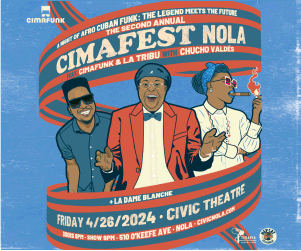A new film that chronicles the journey of two men along the Mississippi River will have its U.S. premiere at the New Orleans Jazz Museum on Tuesday, January 18, at 6 p.m. Southwind is a cinematographic essay by artists Maxime Berthou and Mark Požlep, curated by Amy Mackie and organized by PARSE NOLA, and screened as part of the final week of the contemporary art triennial Prospect New Orleans.
Berthou and Požlep embarked on a practice-based research journey on the Mississippi River from September 2 to October 20, 2019. Their means of transportation was a hand-built, 20-foot steam-powered paddleboat named Thumpa. Their goal was to research and experience contemporary life along this mythical 2,300-mile-long river.
The pretext of the trip was to collect corn from local farmers in ten different states—Minnesota, Wisconsin, Illinois, Iowa, Missouri, Tennessee, Kentucky, Arkansas, Mississippi, and Louisiana—and to interact with those involved in the farming, sale, and distribution of the cash crop. Production of corn plays a major role in the economy of the United States and most of it is used to produce ethanol for the oil industry.
Modern-day corn production production severely and negatively impacts the ecology of the Mississippi River. throughout their journey, Berthou and Požlep encountered a landscape that has been impacted by what is known as capitalocene, a means of understanding how capitalistic pursuits are directly contributing to environmental degradation. All of the farmers the artists met along their journey are using GMO (genetically modified organisms) to produce their crops. They told Berthou and Požlep that genetically modified crops restrain the usage of pesticides and herbicides and therefore it is seen as progress in farming. As the artists learned, the farmers’ denial of climate change was overwhelming and clearly fueled by industrial, political and ideological interests. The use of fertilizers, pesticides and fuel make farming a major contributor to poor air and water quality to the Mississippi River while also impacting climate change.
Southwind will be screened outdoors at no admission charge. Visitors are asked to dress warmly and bring a chair or blanket. Berthou will be present to introduce the film. The New Orleans Jazz Museum is located at 400 Esplanade Avenue. For more information, visit here.




